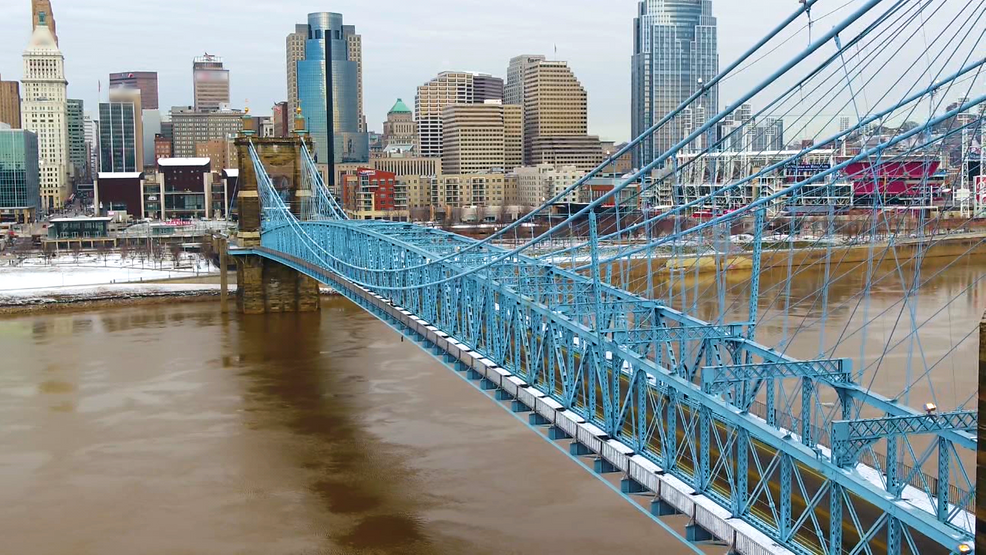Ed Conway
Sky News
Tue, 17 May 2022 20:22 UTC
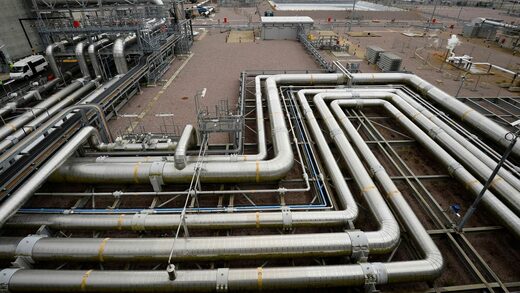
The UK is drowning in gas - but consumers will get little or no relief from these very low prices
The UK energy system is drowning in natural gas. There is so much of the stuff in this country that for the time being at least no-one is quite sure what to do with it.
If at this stage you're wondering whether I've lost my mind or that you're reading an article from a year or two ago: no.
It is the middle of May 2022; the war in Ukraine is still raging; Europe is attempting desperately to pivot away from Russian natural gas and UK
household energy bills (including, yes, gas bills) are at record levels.
And I promise I haven't lost my marbles. The UK really is experiencing an almost unprecedented glut of natural gas.
This probably still sounds implausible, so consider as proof, the spot price of gas on wholesale markets right now. We're talking here about what are known as "day ahead" prices: the price you'd pay for natural gas if you wanted it delivered tomorrow.
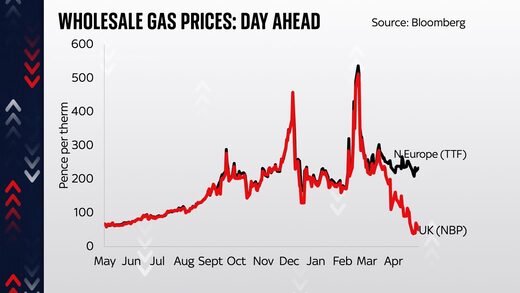
The main North European price (TTF, as it's known) has come down a little since the Russian invasion of Ukraine but it is nonetheless considerably higher than before the invasion, and
more than double the level it was last summer.
Now look at the main UK wholesale gas price, the NBP or "national balancing point" to give it its technical name. It has fallen from around 285p a therm in late March to just 38p a therm a few days ago. At the time of writing it had bounced up to 100p a therm, but was still far lower than before the Russian invasion. In fact, these wholesale prices are at the lowest level for nearly 18 months.
What's going on here? Why are UK prices so low, while they remain so high on the other side of the Channel?
To understand the answer, you need to remember
energy markets are in large part, a product of physical infrastructure. Not only do you need to get natural gas out of the ground, you also need to build the pipelines to get it into people's homes. When it comes to gas, geography matters; steel tubes matter.
Much of Europe is, as we all know, highly reliant on Russian gas, most of which is piped in via a string of pipelines across eastern Europe, the Baltic and Black Sea into central Europe. Germany, in particular, is deeply dependent on this flow of gas.
And, as you also know, everyone in Europe is doing everything they can to reduce their reliance on Russian gas.
Good news...and not so good
Now, Europe could potentially get more gas from North Africa and some too from Azerbaijan, which is constructing new pipelines into the continent.
It can't get much more gas from the North Sea, either from Norway or the UK - in large part because they (primarily Norway) are already pumping as much as they physically can right now.
That leaves the other option: getting the gas in via tanker from further afield. The good news here is there is potentially quite a lot of gas available, especially from the US, whose shale fields are producing methane at a rapid rate.
But now we run into other problem with the physical infrastructure:
even if there were a limitless supply of gas in America and a limitless number of LNG (liquefied natural gas) tankers to transport it to Europe, there aren't enough terminals through which we can receive it. Actually it's slightly more subtle than that: there aren't enough LNG terminals in the right places.
There is actually lots of LNG capacity in the Iberian peninsula, but the problem is piping that gas from Spain to Germany is very difficult indeed. There are three big terminals in the UK. There are some terminals in France. But there isn't a single LNG terminal in Germany.
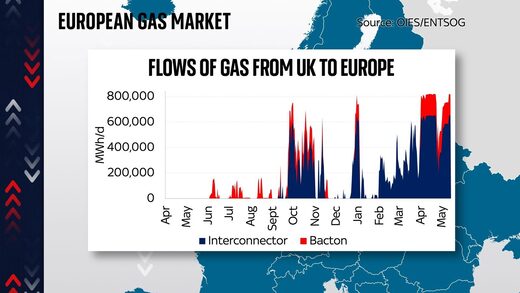
In recent months, there has been an enormous amount of LNG redirected to Europe (attracted by the high gas price), but the ships are running out of places to put their gas. This brings us back to the UK, where plenty of LNG has been flowing off tankers, through regasification facilities and into the gas grid in recent weeks.
The two gas pipelines which connect the UK with the rest of Europe are running at full capacity right now (indeed, they have been running at 20 per cent above capacity recently).
The problem, however, is
these pipes simply aren't big enough to push all the gas coming into the UK via those LNG tankers through into continental Europe. And since
we don't have much domestic storage in this country and since it's quite warm right now and most of our boilers are turned off,
there isn't really anywhere else for the gas to go.
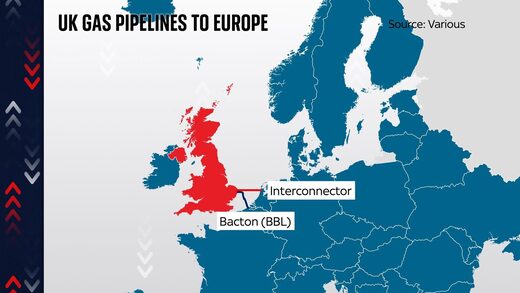
There have been some odd consequences. One is that with all this cheap day-ahead gas knocking around, Britain's power generators have been making merry,
turning on their gas-fired power stations and producing as much electricity as they possibly can.
The upshot is the UK, which typically has to rely on imports of electricity from the continent, has temporarily become a big exporter of electricity, sending power at a rate of more than four gigawatts across to mainland Europe in recent days.
The other upshot is that not only are natural gas prices very low, so too are wholesale electricity prices, which are now lower in this country than in most other parts of Europe.
Interesting footnote: if Britain had more domestic storage (instead of
having run down our biggest underground gas reservoir a few years ago) we could be putting more of this cheap gas aside, ahead of what could be a grisly winter. Instead we are burning it in power stations. On the flip side, if we had lots of storage then that's extra demand for the gas, which could mean this price anomaly wouldn't be happening.
Anyway, at this stage you're perhaps wondering: how soon until this is reflected in my bill? Is the cost of living crisis now over?
I'm afraid the answer in both cases is depressing. For while it's certainly true wholesale prices of g
as and electricity for next-day delivery are indeed at rock bottom levels, the domestic energy suppliers with whom we all have our accounts say they tend instead to sign up to contracts for energy delivered months or even years ahead.
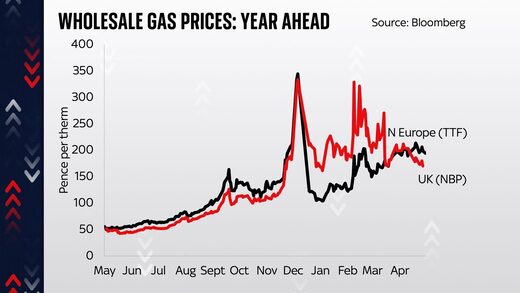
And when you look at the year-ahead price for gas, it is at nearly the same level as in north Europe, and is still considerably higher than before the invasion. In other words,
even though the UK is drowning in gas, markets suggest we won't be in a few months' time, and that as a consequence, consumers get little or no relief from these very low prices.
One reason these markets might be right, is that many countries in northern Europe are moving very quickly to install LNG capacity.
While
it takes some years to build a full-blown gas terminal such as the three we have in the UK, according to Mike Fulwood of the Oxford Institute of Energy Studies, there is
a temporary solution: special tankers known as floating storage rig units (FSRUs).
The Dutch are already bringing a few of them into operation and Germany is planning to start one up in the winter. So come the cold months, the market could indeed be proven right.
These very low prices could just be a temporary anomaly.
Even so, there is something surreal about the situation. If only for a short period, in an era of natural gas shortage, of record natural gas prices, Britain all of a sudden has a natural gas glut.











